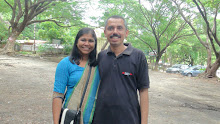മനുഷ്യരെ പിടിക്കുന്നവൻ!
“എന്നെ അനുഗമിക്കുക, ഇന്നു മുതൽ നീ മനുഷ്യരെ പിടിക്കുന്നവൻ ആകും.”—ലൂക്കോസ് 5:ഏകദേശം ഇരുപത് കൊല്ലo ഞാൻ റിക്രൂട്ട്മെന്റ് മേഖലയിൽ പ്രവർത്തിച്ചു. പതിനായിരക്കണക്കിന് ഉദ്യോഗാർത്ഥികൾ എന്റെ മുന്നിലൂടെ കടന്നുപോയിട്ടുണ്ട്. ആയിരങ്ങൾ വിവിധ ജോലികളിൽ പ്രവേശിച്ച് സന്തുഷ്ടരായി ജീവിക്കുന്നു. ചിലരെങ്കിലും ഇടയ്ക്ക് ഒരു ഫോൺ വിളിയിലൂടെയോ അല്ലെങ്കിൽ ന്യൂ ഇയർ, ക്രിസ്മസ്, ഓണാശംസകൾ അയച്ചോ സ്നേഹബന്ധം നിലനിർത്തുന്നു.
ഞാൻ എനെറെ തൊഴിലിൽ ഏറ്റവും സന്തോഷവും സംതൃപ്തിയും കണ്ടെത്തിയത് , ജോലിയിൽ പ്രവേശിച്ച് ഏറെ വർഷങ്ങൾക്ക് ശേഷമാണ്. വർഷങ്ങൾ കഴിഞ്ഞപ്പോൾ മടുപ്പും ഒരേ ജോലി ചെയ്യുന്നതിലെ വിരസതയും എന്നെ നിരന്തരം വേട്ടയാടി. കൂടാതെ ബഹുഭൂരിപക്ഷം ഉദ്യോഗാര്ഥികളും ജോലി കിട്ടിയശേഷം കാണിക്കുന്ന കൃതജ്ഞതയില്ലായ്മ യും എന്നെ ഏറെ വിഷമിച്ചിരുന്നു.
ഈ സമയത്താണ് എന്നോട് വളരെ സ്നേഹവും വാത്സല്യവും ഉള്ള ഒരു സിസ്റ്റർ എന്റെ മനോവിഷമം തിരിച്ചറിയുകയും ചെയ്യുന്ന ജോലിയിൽ സംതൃപ്തി നേടാൻ അതിലെ പ്രത്യേകത കണ്ടുപിടിച്ച്, മനസ്സിലാക്കി വലിയ ഒരു കാൻവാസിൽ ചിത്രം പൂർണ്ണമായി ഉൾക്കൊണ്ട് ആ ജോലിയുടെ അസാധാരണത്വവും മഹത്വവും തിരിച്ചറിഞ്ഞു മുന്നോട്ടു പോകാൻ പ്രേരണ നൽകിയത്. സിസ്റ്റർ മുകളിലത്തെ ബൈബിൾ വാക്യം സൂചിപ്പിച്ചുകൊണ്ട്, നീ മനുഷ്യരെ പിടിക്കുന്ന ജോലിയാണ് ചെയ്യുന്നത്. അത് ആത്മാർഥമായി ചെയ്യുക, ആയിരങ്ങൾക്ക് അവരുടെ ജീവിതം അർത്ഥവത്താക്കി കൊടുക്കാൻ നിനക്ക് സാധിക്കും, എന്ന അനുഗ്രഹ വചസ്സുകളോടെ എന്നെ പറഞ്ഞയച്ചു.
പിന്നീട് ഞാൻ ശാന്തമായി ഇരുന്ന് ആലോചിച്ചപ്പോൾ, എന്നിലെ കുറെ നന്മകൾ എനിക്ക് മുൻപിൽ തെളിഞ്ഞു വന്നു. ഒരു കൺസൽട്ടൻറ് എന്നനിലയിൽ, ശരാശരിയിലും മുകളിലുള്ള നല്ല നല്ല കമ്പനികൾക്ക് വേണ്ടിയാണ് ഞാൻ റിക്രൂട്ട്മെന്റ് നടത്തിയിരുന്നത്. നിലവാരമുള്ള സ്ഥാപനങ്ങൾ, നിലവാരമുള്ള പദവികൾ , നിലവാരമുള്ള ശമ്പളം! ഒട്ടനവധി യുവാക്കളുടെ ജീവിതത്തിൽ നാഴികക്കല്ലായി അവർക്ക് നല്ലൊരു ജോലി ലഭിക്കാൻ ഞാനവരെ സഹാച്ചിട്ടുണ്ട്. തീർച്ചയായും അവരവരുടെ കഴിവുകൾ തന്നെയാണ് അവർക്ക് നല്ല ജോലി ലഭിക്കാൻ കാരണമായത്. എങ്കിലും ഒരു വഴികാട്ടിയാവാൻ എനിക്ക് സാധിച്ചു. സിസ്റ്ററുടെ വാക്കുകൾ എന്റെ ഹൃദയത്തിൽ നിറഞ്ഞു നിന്നു - മനുഷ്യരെ പിടിക്കുന്നവൻ!!
പിന്നീട് പലപ്പോഴും ഒരു സുവിശേഷ വേലയാണ് ഞാനും ചെയ്യുന്നത്, എന്ന തോന്നൽ ഒരുപാട് സന്തോഷവും സംതൃപ്തിയും നൽകി. യേശു തന്റെ ശിഷ്യന്മാരെ തിരഞ്ഞെടുക്കുന്നതിൽ കാണിച്ച മാതൃക, വലിയ പ്രചോദനമായി. ഓരോ ഇന്റർവ്യൂ വിലും മുന്നിൽ വരുന്ന ഉദ്യോഗാര്ഥിയുടെ എന്ത് നന്മയാണ് മേന്മയാണ് എനിക്ക് കണ്ടെത്താൻ കഴിയുക എന്നതിലായി എന്റെ ശ്രദ്ധ. പിന്നീട് ഹൊവാർഡ് ഗാർഡ്നർ പറഞ്ഞുവച്ച ബഹുമുഖ ബുദ്ധി വൈഭവത്തിന്റെ തിയറി പഠിക്കുമ്പോൾ എന്റെ മുന്നിൽ വരുന്നവരിൽ ആരും തന്നെ കഴിവു കുറഞ്ഞവരില്ല എന്ന സത്യം മനസ്സിലാക്കി. സെലക്ട് ചെയ്തില്ലെങ്കിൽ കൂടി, അവരെ പോസിറ്റീവ് ആയി മോട്ടിവേറ്റ് ചെയ്ത് ഇന്റർവ്യൂ ക്യാബിനിൽ നിന്നും പറഞ്ഞയക്കാൻ എനിക്ക് സാധിച്ചു.
കരിയർ ഗൈഡൻസ്, കമ്പനികളിലെ ജോലിക്കാർക്ക് വേണ്ടിയുള്ള പരിശീലന പരിപാടികൾ എല്ലാം യേശുവചനങ്ങൾ പ്രചോദനമാക്കി മനോഹരമാക്കുവാൻ സാധിച്ചു. അടിസ്ഥാനം കൂടാതെ മണ്ണിൽ വീട് പണിത മനുഷ്യനും ഉറച്ച പാറമേൽ അടിസ്ഥാനം കെട്ടി വീടുപണിത മനുഷ്യനും കലാലയങ്ങളിൽ വിദ്യാർത്ഥികളിൽ പറയാതെ, എന്തൊക്കെ ഗൈഡൻസ് കൊടുത്താലും എന്തു പ്രയോജനം. അങ്ങിനെ ആഴത്തിൽ പഠിക്കുമ്പോൾ യേശുവിന്റെ ഓരോ വചനവും നിത്യജീവിതവുമായി കൂട്ടിക്കെട്ടി നല്ലൊരു ഭാവി കെട്ടിപ്പടുക്കാൻ യുവാക്കൾക്ക് ഇത്രയധികം പ്രചോദനം നല്കുന്ന മറ്റൊരു മോട്ടിവേഷണൽ സ്പീക്കർ വേറെയില്ല എന്നു മനസ്സിലാവും.
താലന്തുകൾ
പത്ത് കന്യകമാരുടെ ഉപമ
അഷ്ടസൗഭാഗ്യങ്ങൾ,
ഇങ്ങിനെ ഓരോ സുവിശേഷ ഭാഗവും നമ്മുടെ നിത്യജീവിതവുമായി ഇഴചേർന്നു നിൽക്കുന്ന ദിവ്യ രത്നങ്ങളാണെന്ന് തിരിച്ചറിയാൻ കഴിഞ്ഞാൽ, നമുക്ക് നമ്മെ തന്നെ തിരിച്ചറിയാൻ (ആത്മാവബോധം) ഈ വചനങ്ങൾ നിത്യവും ധ്യാനിച്ചാൽ മതി. ലോകാരോഗ്യ സംഘടന പറഞ്ഞിരിക്കുന്ന പത്ത് ജീവിത നൈപുണ്യ കലകളിൽ ഒന്നാമതായി വരുന്നത് 'സ്വയം അവബോധം' തന്നെയാണ്.
സ്വന്തം കണ്ണിലേക്ക് നോക്കുക, സ്വന്തം കണ്ണിലെ തടിക്കഷണം എടുത്തു മാറ്റുക, അതിനുശേഷം മറ്റുള്ളവരുടെ കണ്ണിലെ കരട് എടുക്കാം - ഈ വാചകത്തിലൂടെ സ്വയ അവബോധത്തിന്റെ ഏറ്റവും വലിയ സന്ദേശം യേശു ലോകത്തിന് നൽകുന്നു. നമുക്കൊക്കെ ഏറ്റവും ബുദ്ധിമുട്ടുള്ള കാര്യം സ്വയം ഉള്ളിലേക്ക് നോക്കുക എന്നതുതന്നെയാണ്. മറ്റുള്ളവരുടെ ആയിരം കുറ്റങ്ങൾ കണ്ടുപിടിക്കാൻ എളുപ്പമാണ്. എന്നാൽ ശാന്തമായി സ്വസ്ഥമായി ഇരുന്ന് സ്വന്തം ഉള്ളിലേക്ക്, ഉണ്മയിലേക്ക് അൽപനേരം നോക്കാൻ (ധ്യാനിക്കാൻ) ഏറെ പ്രയാസമാണ്. പക്ഷെ അത് ശീലിക്കാൻ സാധിച്ചാൽ നിങ്ങൾക്ക് ലോകം കീഴടക്കുവാൻ സാധിക്കും. സ്വയാവബോധമാണ് വിജയത്തിന്റെ താക്കോൽ എന്ന സോക്രട്ടീസ് പറഞ്ഞത് അതുകൊണ്ടു തന്നെയാണ്.
“നിങ്ങൾ ലോകമെങ്ങും പോയി, എല്ലാ സൃഷ്ടികളോടും സുവിശേഷം. പ്രസംഗിക്കുവിൻ" (മർക്കോ 16,15) യേശു ഈ വാക്കുകൾ പറഞ്ഞിരിക്കുന്നത് നാമോരോരുത്തരോടുമാണ്. സു+വിശേഷം അഥവാ നല്ല വിശേഷങ്ങൾ, നല്ല വാർത്തകൾ ലോകത്തോട് പറയാൻ ബാധ്യസ്ഥരാണ് നാമോരോരുത്തരും. എന്നാൽ നാമിന്ന് സാമൂഹ്യ മാധ്യമങ്ങളിൽ കൂടി വെറുപ്പ്, വിദ്വേഷം, വ്യാജം, കപടത, നിന്ദ, വ്യക്തിഹത്യകൾ ഫോർവേഡ് ചെയ്യുന്ന, ഷെയർ ചെയ്യുന്ന പാവകളായി ജീവിക്കുന്നു? സുവിശേഷം (നല്ല വിശേഷങ്ങൾ) പറയാൻ ബാധ്യസ്ഥരായ നമ്മൾ വിഷം പരത്തുന്ന ക്രിസ്തു ശിഷ്യരായി അറിയപ്പെടുന്നു!!
നമുക്ക് ഓരോ ദിവസവും ഒന്ന് ആത്മപരിശോധന നടത്തിയാലോ? ഇന്ന് ഞാൻ പകർന്നത് സുവിശേഷമാണോ? സദ് വർത്തയാണോ?
----------------------








